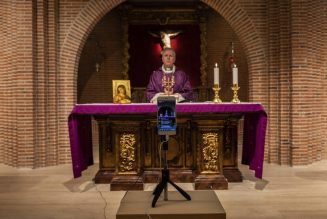By Clement Harrold

The story of the Finding of the Boy Jesus in the Temple brings a range of emotions to the surface. For many Catholics, the whole episode can feel baffling, if not downright traumatic. More than any of the other joyful mysteries, this one seems to encapsulate the title of William Shakespeare’s comedy, All’s Well That Ends Well!
St. John Paul rightly noted that the mystery is a story of joy mixed with drama. In some deep sense, therefore, the Finding in the Temple speaks to exactly the kind of joy which ought to mark the Christian life: a joy which acknowledges the many hardships which lie between us and heaven, without trying to ignore or downplay them. It is the joy, too, of realizing at the end of our trials and troubles that God knew what He was doing all along.
This is the joy which Mary and Joseph share when they finally reach Jesus after three days of searching. It is not merely the deep sense of relief at finding their child again. Even more than that, it is the joy which comes with discovering that all this pain and loss took place for a reason, and Jesus knew exactly what He was doing.
The Finding of the Boy Jesus in the Temple therefore reveals something profound about the mystery of human suffering. Indeed, the question on the lips of Mary and Joseph is one which has echoed in the heart of every believer down the centuries who has experienced intense pain: “Son, why have you treated us so?” (Lk 2:48). In the midst of grief, loneliness, anguish, and hurt, our cry to Jesus becomes no less spirited than that of His human parents: “Why, Jesus, why have you treated us so?”
Although Mary and Joseph commit no sin in this episode, nevertheless their experience of losing their Child for three days allows them to enter into our own weakness and frailty in an extraordinary way. For those of us who have ever felt distant from God, or who have ever felt the divine life depart from us as a result of a mortal sin we have committed, the fifth joyful mystery reminds us that Mary and Joseph know our pain, for they have in some sense tasted it.
God allowed Mary and Joseph to experience what it was like to have Himself taken from their midst, thereby offering them a personal insight into the desolation of sinners everywhere. When St. Luke describes how they searched “anxiously” for their Son, he uses the Greek word odynōmenoi. The only other place this word appears in his Gospel is to describe the fiery anguish experienced by the rich man in hades: “Father Abraham, have mercy upon me, and send Lazarus to dip the end of his finger in water and cool my tongue; for I am in anguish (odynōmai) in this flame” (Lk 16:24).
The implication is startling: for Mary and Joseph, those three days of searching were hell on earth. And for Mary especially, who “kept all these things in her heart” (Lk 2:51), they were a foretaste of events to come, some two decades later, when Christ would spend three days in the tomb. If we have ever felt far from heaven, we should be consoled in the knowledge that Mary and Joseph know our pain, and they are constantly and anxiously searching for us, just as they searched Jerusalem high and low in their desperate attempt to be reunited with their Son.
While the Finding in the Temple marks the last time that St. Joseph appears in the Gospels, it is at the same time a reassuring reminder to us that he was still alive during Jesus’s formative years. What is more, the episode points beyond the fatherhood of Joseph to the divine fatherhood of God Himself. Indeed, the first ever recorded words of the God-Man come in the form of this mysterious statement: “How is it that you sought me? Did you not know that I must be in my Father’s house?” (Lk 2:49). St. John Paul II described the exchange in this way:
The revelation of his mystery as the Son wholly dedicated to his Father’s affairs proclaims the radical nature of the Gospel, in which even the closest of human relationships are challenged by the absolute demands of the Kingdom. … To meditate upon the “joyful” mysteries, then, is to enter into the ultimate causes and the deepest meaning of Christian joy. It is to focus on the realism of the mystery of the Incarnation and on the obscure foreshadowing of the mystery of the saving Passion.” (Rosarium Virginis Mariae §20)
In meditating on the fifth joyful mystery, we can pray that Mary and Joseph would lead us to their Son who resides in His Father’s house, which is the Catholic Church. In the Church and in her sacraments we discover Jesus, the One who reveals Himself with infinite tenderness as the answer to all our fear, all our pain, all our confusion, all our hurt, all our shame. In the Father’s house we will find Him, and in that house we ourselves will be found.
Clement Harrold earned his master’s degree in theology from the University of Notre Dame in 2024, and his bachelor’s from Franciscan University of Steubenville in 2021. His writings have appeared in First Things, Church Life Journal, Crisis Magazine, and the Washington Examiner.
You Might Also Like
With Introduction, Commentary, and Notes by Scott Hahn and Curtis Mitch, the Ignatius Catholic Study Bible is uniquely designed to help you read the Scriptures from the heart of the Church. Drawing on the best of modern biblical scholarship, while remaining faithful to the interpretation of the Church, the complete Ignatius Catholic Study Bible is a veritable study library within a single cover.










